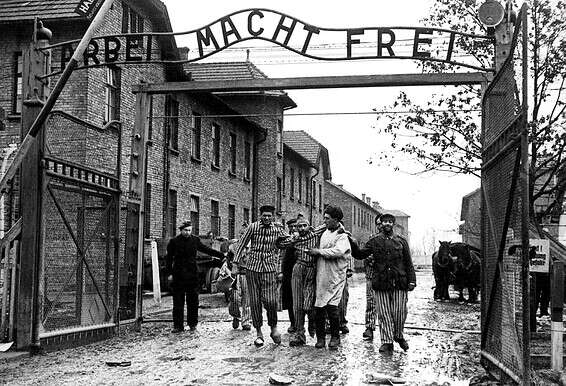The Holocaust's academic research in universities and colleges in Israel is characterized by a low number of courses, a decrease in the scope and the level of research - a special report from the Israeli National Academy of Sciences warns:
Israeli researchers contribute less. The photos have nothing to do with the story
Photo:
Photo Archive: Dudu Greenshpan
Inmates liberated from the Auschwitz camp
Photo:
Archive: Gettyimages
Israeli researchers contribute less to academic discourse on Holocaust: Lack of faculty exploring the core areas of the Holocaust and preference to investigate the commemorative enterprise, ignoring the holocaust of the Jews of the Netherlands, France and Belgium The type of the Israeli National Academy of Sciences on the state of Holocaust studies in universities and colleges.
The report, written by a special committee established by the Israeli National Academy of Sciences, indicates a significant decline in research and quality, a paucity of courses and research on the subject of the Holocaust and World War II, and even warns of historical distortions in the use of academic research.
Photo: Reuters
The findings indicate a worrying trend regarding the scope of the course subjects, which is too limited, and the insufficient level of some of the research. For the purpose of writing the report, data from 19 academic institutions were collected, showing that in the past two years, 218 courses for first, second and third degree students were relevant to the committee's examination. Of these, only 53 courses dealt directly with the Holocaust, and all others dealt with indirect historical contexts and commemorative and representative issues.
The report shows that there is less academic research at the core of Holocaust research and historical events, however, lecturers and students prefer to engage in Holocaust memory and commemoration issues - and the report criticizes it sharply and expresses concern about the research implications.
Committee members state that the young scholars in Israel prefer to focus on memory issues, commemorating the Holocaust and aspects of historical events, especially in the fields of art, literature and music, rather than exploring the core of the Holocaust events, engaging in "what was real" and the themes of race and Nazism, racism and Nazism. In the twentieth century and in the powers of the powers towards the Jews before and during the war. Particularly jarring and disturbing is the absence of World War II studies to which Holocaust events are closely related.
A special chapter in the report is devoted to a real withdrawal in the contribution of Israeli researchers to the international academic discourse on the Holocaust. In the opinion of the committee, this is due to both the general devaluation of the humanities and social sciences at the universities of Israel, as well as the lack of historical knowledge and depth of young scholars (some of the veteran scholars were Holocaust survivors themselves) and lack of European languages, which are a basic and necessary tool for the study of the Holocaust.
"For years, the Israeli Academy has been at the forefront of Holocaust research, but in recent years there has been a real retreat in the contribution of Israeli scholars to international academic discourse in the field," the committee members write, adding: Researchers from abroad are engaged, more than before, in exploring the inner lives of Jews, and the Israeli academy has lost its premiere even in this major preoccupation with the study of the history of the Holocaust, "the special report states.
Other findings from the materials are that at Ben-Gurion universities in the Negev, Bar-Ilan and Haifa are missing faculty members who are exploring the core areas of the Holocaust and that no academic institution today has an active faculty member investigating the holocaust of the Jews of the Netherlands, France and Belgium.
In addition, there is a widespread lack of Holocaust scholars and lecturers in the Balkans and North Africa, in Jewish and Zionist youth movements and in their transformation into underground. The authors also claimed that apart from a little deal at the Hebrew University of Jerusalem, in the other institutions there is no comparative reference of the Holocaust to other murders, such as the genocide in Cambodia, Darfur, Syria and Nigeria.
Particular emphasis in the report is that attempts by governments or government bodies in some countries are underestimated by the direct or indirect cooperation of parts of their population with the victims of the Holocaust. "We hope and expect that Israeli researchers will not lend their hand to such trending history," the report said.
Among his recommendations is a wide range of research methods in relevant circles and an increase in the number of courses that give general historical knowledge. In addition, the establishment of a training system for learning languages that are essential for research, in collaboration with non-university institutions, such as Yad Vashem, Ghetto Fighters' House and Beacon Institute. In addition, create an inter-university curriculum that will allow students to specialize in the use of archival materials. Allocation of 3-4 standards at universities to scholars in the field of the Holocaust.

